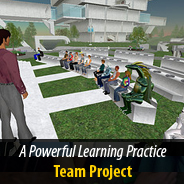The faculty and staff of St. Anne School decided that, in an era where the world was getting smaller, it was important for our students to better understand other cultures. If students are to interact with others as adults, it is important for them to understand their values and practices, and to see them as good people, even if they have different customs. It is far easier to do so as children, when minds are open to new ideas.
Our focus was on professional development for our teachers with a specific emphasis on technology use in instruction.
Overall professional development objectives:
· Participants received an overview of various programs, applications, and technology equipment during our monthly early dismissal day.
o Sample training sessions included: Integration of technology into classrooms – student stations/whole-group, Culturegrams, WAN updated resources, and continued use of United Streaming video clips (through our Discovery Education subscription).
· Participants were introduced to the specific 21st century skills that dealt with global awareness and explored video conferencing opportunities.
o Learning from and working collaboratively with individuals representing diverse cultures, religions and lifestyles in a spirit of mutual respect and open dialogue in personal, work and community contexts. o Understanding other nations and cultures, including the use of non-English languages. Performance Based Assessments:
– Participants were accountable for implementing new strategies and were evaluated through the use of formal teacher observations as well as authentic project-based outcomes.
As a culminating celebration of global literacy skills, we have had a school-wide Multicultural Fair. We expect our students have developed an appreciation for cultures around the world, unlike their own. Students were immersed in activities and learning throughout a day-long celebration of world cultures and all which that entails. Classroom teachers had, prior to the celebration day, explored a select country with their students. Students learned, in depth, about the chosen country’s customs and traditions, both past and present. On March 31, there was a global celebration day where visitors and staff, together, provided opportunities for our students to explore their world and all it has to offer. We had various sessions for students to visit, including a Skyping opportunity with foreign exchange students, an art station where a representative from the Bead For Life organization shared about Ugandan women and their trade, a theatrical station where students explored culture from around the world through drama, a music session where our students participated in African rhythm building and a speaker session where students explore the rich culture and traditions of Peru, Puerto Rico, Greece, Mexico and India.
We are blessed to have a richly diverse population within our school and we believe that by exploring varying cultures, our students were able to develop more of an appreciation for one another and what we have to offer as individuals and as a community.
Much of our success was determined by students’ reactions to activities and their interactions with one another. We feel confident that students thoroughly enjoyed the days’ activities and have also developed a sense of ‘global community’. Our goal was, that by experiencing the Skyping opportunity, our students will wish to connect with others again. As an extension, we have encouraged all of our teachers to explore outreach opportunities that we can accomplish during the last week in April.
· October 2010 : Staff development using Culturegrams, a cultural web resource
· November 2010: Staff development using United Streaming and other cultural web resources
· December 2010: Staff development and time to collaborate – planning and preparation, gathering of multimedia resources and connections.
· January 2011: Preparation and planning for upcoming Multicultural Fair. Collaboration between special areas and within classrooms to develop a plan of action for student learning. Classroom teachers implement cultural lessons/mini-unit on their chosen region/country of the world.
· February 2011: Cancelled due to snow.
· March 2011: Final preparation and planning for upcoming Multicultural Fair. Classroom teachers implement cultural lessons/mini-unit on their chosen region/country of the world.
· March 31, 2011: Multicultural Fair – Students are treated to over 10 activities celebrating various regions of the world/culture including a Skyping session with International Students participating in Youth For Understanding.
We currently have completed the culminating activity, Multicultural Fair, which took place on March 31, 2011. There was a great response to the use of technology resources and many teachers are planning Skyping sessions before the school year’s end.
In reflection, the technology training sessions could have been more directed with specific timelines for tasks that we wished teachers to fulfill. Some sessions seemed counterproductive because some teachers found it very difficult to ‘see the big picture’ and had some anxiety over the lessons they were asked to implement. All in all, our staff made an admirable effort to use the new technological resources and use them well. We were able to integrate new technology and students thoroughly enjoyed each piece of the experience.
Video slide show of Multicultural Day and of Classroom Studies – on laptop
Presentation Board with pictures



Obama and a former gov of Penn..i think it is..seem to think they can use Ows for Obama to win re election clothing fashion